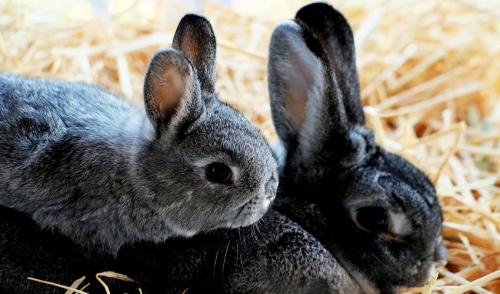
Caring for Pet Rabbits
Rabbits can be fun and engaging pets, but they require different care than dogs and cats. If you understand your pet rabbit's unique needs, however, you can provide them with the right care for a long, happy, healthy life.
What Pet Rabbits Need
Pet rabbits, no matter what the domestic bunny species, need proper care that meets their needs. If you have a pet rabbit, it will need…
- Shelter
Rabbits need someplace they can feel safe and secure. Indoors, that means a comfortable shelter, usually a large cage with plenty of room for them to stretch out and take a few hops. The cage should have good flooring to protect their sensitive feet, and a cubby structure can give them a den-like place to retreat. An outdoor shelter or hutch should be even larger with room to play, and should be tall enough that the rabbit cannot jump out. A wire cover over an outdoor shelter can also help provide protection from predators. Outdoor shelters should have some shade available, and rabbits should not be kept exclusively outdoors, though they should have several hours a day when they can roam and play for adequate exercise.
- Food
A good rabbit diet will include a varied menu. All pet rabbits need plentiful hay for constant chewing and snacking, and timothy or clover hay is the best choice. Fresh vegetables are a great supplement to a rabbit's diet and will provide additional nutrients – dark leaf lettuce, parsley, carrot tops, collard greens, celery and dandelion leaves are all top choices. Softer fruits that are higher in sugar should only be offered as occasional treats, but rabbits will enjoy strawberries, apple slices or melon cubes. In addition to food, there should always be a good supply of fresh, clean water available for the rabbit.
- Litter Box
Pet rabbits can be litter trained and will prefer to use the same space for eliminating waste every time. A shallow litter box is ideal, but do not use cat litter to fill the box – the dust and chemicals in kitty litter can be toxic to rabbits, particularly since rabbits often lay in their litter boxes for extended periods. Use hay to fill the box, and consider having multiple litter boxes in different areas where the rabbit will spend a lot of time in order to minimize accidents.
- Play Time
All pets, even rabbits, need time to play. This is not only great exercise, but also provides an opportunity to bond with your pet, and different types of play will provide mental stimulation and enrichment. A cardboard "castle" or series of boxes can be a great toy the rabbit will explore and chew on, or you can use a variety of rabbit-friendly toys. Playing games with your rabbit, such as chase, tag or fetch, are other options, and some rabbits also enjoy jumping challenges such as obstacle courses.
- Grooming
Rabbits are similar to cats in that they will constantly groom themselves, but they also shed regularly, including dense coat shedding twice each year. Regular grooming can remove loose hair and keep the rabbit's coat and skin in good condition. Regular nail trims will also be necessary to keep your rabbit's claws from snagging on carpeting or fabrics, as well as to minimize uncomfortable scratches.
- Safety
It can be a challenge to keep a pet rabbit safe, since these animals can be very creative at getting into mischief. Bunny-proofing your home is similar to child-proofing – all dangerous chemicals, including house plants, need to be out of your rabbit's reach. Wires and cords need to be covered and moved away from the rabbit's reach as well, or they will chew on them. Baby or pet gates can be used to block off rooms to keep the rabbit out of unsafe areas, or to keep the pet in a room that is completely safe for their exploration.
- Veterinary Care
All pets need regular veterinary care, and you will need to find a veterinarian who is familiar with pet rabbits. Because these are prey animals, they often hide any signs of weakness, illness or injury, but if you are familiar with your rabbit's behavior, you will be able to notice any abnormalities and seek appropriate veterinary care right away. Regular checkups can also help keep your pet rabbit in peak condition.
With conscientious, thoughtful care, pet rabbits can live 10 years or longer. Rabbit owners who understand their pet's needs and work to give rabbits a safe, comfortable home can enjoy these fun, furry companions as great pets for a long time.
